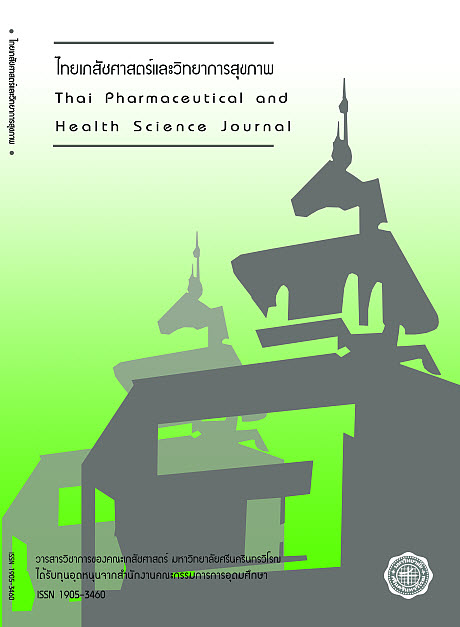Use of Medication Reconciliation in Addition to Drug Use Counseling for Diabetic Out-patients
Abstract
Objective: To evaluate medication reconciliation process with pharmacistcounseling in diabetic patients in Nopparat Rajathanee hospital in 3aspects including economic, patient and clinical outcomes. Methods: Inthis descriptive and analytical prospective study, medication reconciliationwas used to determine medication history, drug related problems, costs ofreturned medications, as well as recommendation for problem resolution.Data were collected from 3 visits. Results: Of the 200 patient included,most patients received medications solely from Nopparat Rajathaneehospital. Medication reconciliation helped reduce medication cost in all 3visits with a total saving of 151,963.60 baht. A total of 397 drug relatedproblems were found in 3 visited; 304, 47 and 46 in visits 1, 2 and 3respectively. This reduction was statistically significant (P < 0.001). FBSlevels decreased significantly (from 175.00 ± 76.58 mg/dl in visit 1, to164.21 ± 62.15 and 143.02 ± 44.68 mg/dl in visits 2 and 3 respectively, P =0.006). HbA1C levels also decreased from 8.82 ± 0.62% in visit 1 to 7.32 ±0.75 and 7.30 ± 0.71%, in visits 2 and 3 respectively. A decrease from visit1 to 3 was statistically significant (P = 0.001). Conclusion: Medicationreconciliation in addition to pharmacy counseling results in a decrease indrug related problem, cost saving and improved clinical outcomes indiabetic patients.Keywords: medication reconciliation, diabetes mellitus, out-patient, fastingblood sugar, HbA1CDownloads
Download data is not yet available.
Downloads
Published
2012-02-12
Issue
Section
Original Research Article - นิพนธ์ต้นฉบับ
License
ลิขสิทธิ์ (Copyright)
ต้นฉบับที่ได้รับการตีพิมพ์ในวารสารนี้ถือเป็นสิทธิ์ของไทยเภสัชศาสตร์และวิทยาการสุขภาพ การนำข้อความใด ๆ ซึ่งเป็นส่วนหนึ่งหรือทั้งหมดของต้นฉบับไปตีพิมพ์ใหม่จะต้องได้รับอนุญาตจากเจ้าของต้นฉบับและวารสารก่อน
ความรับผิดชอบ (Responsibility)
ผลการวิจัยและความคิดเห็นที่ปรากฏในบทความเป็นความรับผิดชอบของผู้นิพนธ์ ทั้งนี้ไม่รวมความผิดพลาดอันเกิดจากเทคนิคการพิมพ์




